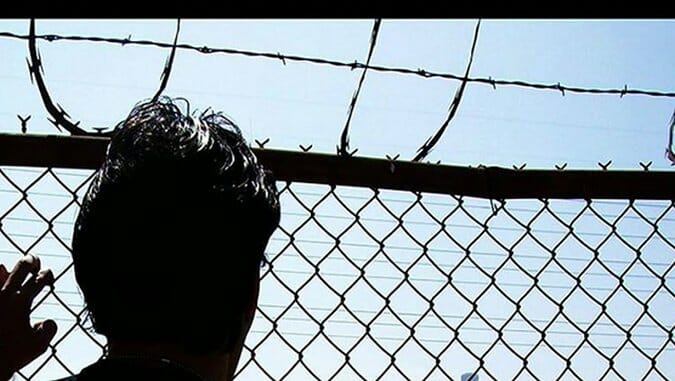The Algerian

A well-meaning, independently financed movie about the spiritual and philosophical struggles of a sleeper-cell jihadi leading up to a planned suitcase-nuke terrorist attack, The Algerian plays out more like an exercise in cinematic Socratic method than anything resembling a cogent drama. Written and directed by Giovanni Zelko (from a story conceived with lead actor Ben Youcef), the film is at first only haphazardly structured, but soon tumbles into temple-rubbing silliness, undone by speechifying and cardboard characterizations.
The story centers on Ali (Youcef), a young immigrant and engineering student studying in Los Angeles. After a cold open that establishes the tragic backstory that makes him a candidate for religious radicalization, the rest of The Algerian tracks back and forth between Ali’s sleeper-cell training and his Stateside interactions with various people he encounters, like on-leave serviceman Patrick (Josh Pence) and bike shop owner Mohammed (Zuhair Haddad), a fellow Muslim immigrant.
As an actor, Youcef is smart enough to underplay the generalized isolation and other fears rippling through his character, and similarly, composer James Bartlett makes use of some understated music. But The Algerian puts all of its ideas and conflict into its dialogue, and then repeats them over and over amidst a flat, thinly imagined visual palette and static compositions. One rarely has a sense of any legitimate, broader world, which could have fed a sense of the tension and conflict within Ali. Instead, once Ali meets a character, he tends to meet up with that character again and again at the same place. That’s great for scheduling on an independent film, I well understand, but it makes for an unconvincing movie.
Much of The Algerian seems intended as a sort of sociopolitical parable for our times, with scenes of Ali’s interactions with the aforementioned Mohammed and a kindly local imam, Suleyman (Harry Lennix), cast in relief against sequences of training by his radical-minded overseas benefactor (Said Faraj), who is laying the groundwork for a grand holy war. As awkward as that might sound, it could conceivably work—portraits of devout, nonviolent Muslims counterbalanced by a perverted religious ideology—if only Zelko could craft passably realistic supporting figures to fill out Ali’s perspective. Instead, The Algerian presents a risible array of two-dimensional types.
-

-

-

-

-

-

-

-

-

-

-

-

-

-

-

-

-

-

-

-

-

-

-

-

-

-

-

-

-

-

-

-

-

-

-

-

-

-

-

-








































